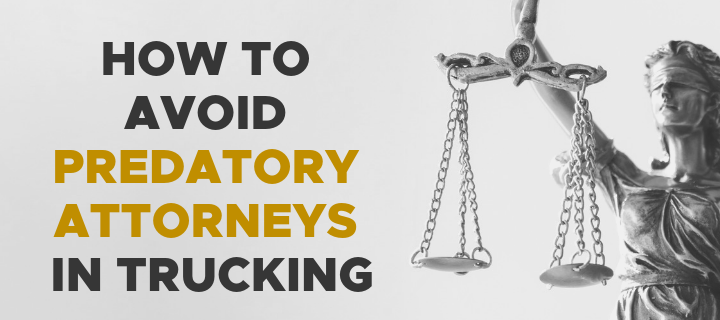How to Avoid Predatory Attorneys in Trucking

Are huge accident settlements like the 90 million dollar Werner case shocking you? There is a disturbing trend we have noticed that continues to prove true. Predatory attorneys are hunting for these big ticket accident cases in larger numbers. There are a few factors that play into these attorney decisions. To learn more about the epidemic, keep reading.
Trucking Liability Insurance: What is Required?
Any truck line, no matter the size, is required to carry a minimum amount of liability insurance. Currently that amount is $750,000. However, most smaller trucking companies carry at least $1,000,000 and some have up to $5,000,000.
When you get to the largest truck lines, like Werner, they usually carry $20,000,000 to $100,000,000 in liability insurance. Often, but not always, these companies are self-insured. Companies this large can afford to self-insure because of both their cash flow and their volume of drivers. The benefit of self-insuring is primarily financial, less output of funds to outside companies; but it also allows them to make different hiring decisions than companies that go with an outside insurance agency. Companies who self-insure can hire less experienced drivers, or drivers with a questionable driving history and chose to absorb that risk unlike smaller truck lines that have outside insurance with rigid hiring standards.
In order to self-insure, large companies have to prove to the FMCSA that they have evidence of a sound internal insurance program and, "that it will maintain a net worth that will ensure that it will be able to meet its statutory obligations to the public to indemnify all claimants in the event of loss."
What this means is that trucking companies have to be very large before they are approved for using a self-insurance program.
What is the Difference Between Primary and Secondary Liability Insurance?
As a trucker you are required to carry both primary and secondary liability insurance. The FMCSA requires that if you are driving under another companies authority, as in cases when you are an independent contractor leased onto a carrier, they must cover your primary liability. This is the liability insurance that covers the public in the case of an accident.
If you are a company driver, your employer is also required to cover your secondary liability insurance, or the coverage for you personally in the event of an accident. For independent contractors, you will secure this insurance yourself.
In almost all cases, both the truck driver and the company of authority will be named in the lawsuit.
How Attorney's Make Their Money
In accident cases, attorney's make their money when their client wins a case with a financial settlement. Most attorney's claim about one third of this settlement money as their payment for litigating the case.
As a result, attorneys naturally want to go after cases where they have the most potential to make good money.
If a smaller trucking line is involved in an accident and carries only $2,000,000 of liability insurance, attorneys know that their payout will be smaller than if they take on a case where the trucking company carries $15,000,000 in liability insurance.
There are plenty of wonderful lawyers who work with clients based solely on the moral merits of their case, but there are others who are simply in it for the payout, and the harsh reality is that larger trucking companies have a greater likelihood of offering a big payout.
We have seen a huge increase in the number of law agencies advertising their services to "victims of accidents with self-insured trucking companies." Why? Because if a company is self-insured they are guaranteed to have a higher cash flow and larger liability policies. This is quite simply a ploy to pull in accident victims who have the potential to make them the most money.
Why Location Matters
The presence of self-insurance isn't the only factor attorneys consider when selecting their cases. They also look at the location of the accident.
Different areas of the country have different liability laws. Some states say you have to be 75% at fault to be considered liable for the accident whereas other states have a burden as low as 51%. Some states even have a 50/50 rule; even if you are only half at fault they can still go after you.
Beyond liability laws, lawyers also consider the potential for a sympathetic jury. In the case of Werner, the area of jurisdiction was quite sympathetic to non-commercial drivers, whereas other areas of the country would have reacted quite differently to the same set of circumstances.
Attorneys are experts at reading potential juries and understanding what will, and will not, fly in a given jurisdiction.
How Can Truck Drivers Protect Themselves?
Cases like the Werner settlement embolden predatory law practices. We anticipate that cases like this will continue to increase in coming years.
So what does all of this mean for truck drivers? How can you avoid predatory trucking attorneys?
1. Document Everything
First and foremost, how you document your day with e-logs and how you handle an accident from the moment it happens is incredibly important. Professionalism and accurate record keeping gives your company (and their insurance company) the best opportunity to defend you to the fullest.
2. Consider Company Size
There is no hard and fast way to make sure you don't fall victim to predatory attorneys. However, when looking at the statistics, working for, or leasing onto, larger companies may put you more at risk. Consider this risk when choosing a trucking company.
3. Protect Your Personal Wealth
If you are an independent contractor with little collateral and investments, you may not need an LLC as no court of law will seize your home or vehicle. However, if you have investments beyond your house, such as farm land, commercial properties, sizable stocks, or an inheritance, it is wise to consult with a business professional and protect your assets.
This being said, f you are involved in a particularly horrible accident and are grossly negligent, these corporate shields may not protect you anyway as you can always be sued personally. In law, it is referred to as "piercing the veil", and it does happen in cases of gross negligence.
We hope this review of the current litigious landscape was helpful as you work to protect your investment and build your trucking business. If you have additional questions that we did not cover, add them in the comments below and we will do our best to address them in a future post!
Do you want more content like this? Subscribe to our blog!

